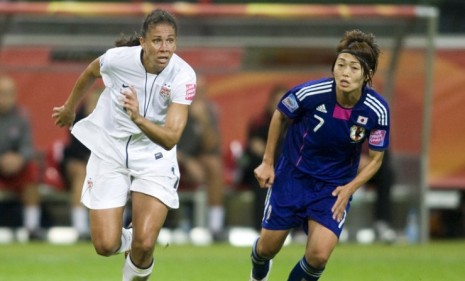5 lessons from the U.S. women's 'inspiring' World Cup run
The American squad faltered with a loss in Sunday's final, but their performance also proved just how far women's soccer has come

After an epic, come-from-behind quarterfinals victory against Brazil, and a tense semifinals win over France, the United States women's soccer team lost the World Cup final to Japan on Sunday in a penalty kick shootout. "It was heartbreaking, and Japan played well and never gave up," said U.S. team captain Abby Wambach. "It wasn't meant to be." Team USA's loss capped off a tournament that was both "inspiring" and "disappointing." What can we learn from this wild ride?
1. America's gritty attitude won — even if America didn't
"The Japanese flourished as underdogs, the role Americans mastered first," says Matty Hammond at Bleacher Report. With the U.S. ahead, the Japanese endured, and twice came from behind to tie the game, and later win. "They were resilient and unafraid of success," unlike the Americans, who were perhaps blinded by their new place in the spotlight, or just exhausted. With their never-say-die attitude, Japan "beat us at our game: Writing American stories."
The Week
Escape your echo chamber. Get the facts behind the news, plus analysis from multiple perspectives.

Sign up for The Week's Free Newsletters
From our morning news briefing to a weekly Good News Newsletter, get the best of The Week delivered directly to your inbox.
From our morning news briefing to a weekly Good News Newsletter, get the best of The Week delivered directly to your inbox.
2. It's hard to feel bad about Japan's victory
"The U.S. and Japan are a world apart, but their cultures share a certain doggedness that goes beyond the norm in the world of futbol," says Michael Arace in The Columbus Dispatch. "In Japan, the word is ganbare, and there is not a proper translation." It roughly means a great level of perseverance. In the wake of the Japanese earthquake and tsunami, it's a word that's has come up quite often. On Sunday, it "sustained a Japanese side that shook up the world of women's soccer," and helped heal the people of Japan.
3. We shouldn't be too upset about America's loss, either
Sure, the U.S. women missed "dozens of scoring chances" in the first half of the final, but let's not "criticize the American team unduly for the loss after such a memorable run," says Sally Jenkins in The Washington Post. "You got the feeling it just wasn’t their day — and you got the feeling that they had that feeling, too." Even though they didn't win, these women should be applauded for giving a great performance both on, and off, the field throughout the tournament. The oft-ignored team "seized the previously apathetic nation's attention with their heart and theatrics, and held it."
A free daily email with the biggest news stories of the day – and the best features from TheWeek.com
4. Women's soccer has come a long way
Like the 1999 World Cup, "this was another watershed moment in sports, another must-see event," says Ann Killion in Sports Illustrated. But this time around, the U.S. women "were not required to be pioneers or social activists or saviors… to build a movement, change their culture, make history," as their predecessors did. " That's real, liberating progress. All this year's team was expected to do was play good, compelling soccer, and that the Americans did.
5. But it still has a long way to go, too
Sure, the country was captivated by the women's World Cup, but "the difference between interest in the World Cup and the domestic game is stark," says Sam Mamudi at MarketWatch. In its third season, the Women's Professional Soccer league draws relatively few crowds. The previous women's league, Women's United Soccer Association, launched after America's triumphant 1999 World Cup win, lasted just three seasons. The WPS has more modest ambitions than its predecessor, and hopefully, it can ride the buzz of the World Cup — 20 of the 21 U.S. players play in the league — to finally "gain a foothold in the sporting landscape."
-
 How the ‘British FBI’ will work
How the ‘British FBI’ will workThe Explainer New National Police Service to focus on fighting terrorism, fraud and organised crime, freeing up local forces to tackle everyday offences
-
 The best family hotels in Europe
The best family hotels in EuropeThe Week Recommends Top kid-friendly hotels with clubs, crèches and fun activities for children of all ages – and some downtime for the grown-ups
-
 Moon dust has earthly elements thanks to a magnetic bridge
Moon dust has earthly elements thanks to a magnetic bridgeUnder the radar The substances could help supply a lunar base